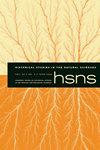范内瓦尔·布什的倒台
IF 0.3
3区 哲学
Q2 HISTORY & PHILOSOPHY OF SCIENCE
引用次数: 0
摘要
Vannevar Bush在第二次世界大战期间是美国研究政策的最前沿,但他在战后遭遇了急剧的下滑,到1948年完全离开了政府服务。是什么导致了如此重大的影响力损失?本文利用以前未经审查的资料,追溯了布什权力下降的原因,他失去了强大的盟友,特别是富兰克林·罗斯福的去世和亨利·斯廷森的退休;他与军方领导人长期不和;以及布什在政治上的一些失误,这些失误疏远了国会和其他地方的人物。战后持续不断的个人冲突不仅影响了布什的职业生涯,也影响了由此产生的资助冷战时期科学的机构的结构。战后向公共机构的过渡不是在战后立即发生的突然变化,而是渐进的,并受到之前个人网络的影响。布什悄无声息地离开政府,与美国研究领域出现军事主导有关,这在很大程度上是以牺牲平民科学领袖为代价的。这种对研究政策控制的转变对战后的举措产生了巨大影响,将科学进步与国家安全紧密联系在一起。本文章由计算机程序翻译,如有差异,请以英文原文为准。
The Fall of Vannevar Bush
Vannevar Bush was at the forefront of American research policy during World War II, but he suffered a steep fall after the war, and by 1948 had left government service altogether. What motivated such a significant loss of influence? Drawing on previously unexamined sources, this article traces the causes of Bush’s decline in authority to his loss of powerful allies, particularly with the death of Franklin Roosevelt and the retirement of Henry Stimson; to his long-standing feuds with military leaders; and to several political missteps on Bush’s part that alienated figures in Congress and elsewhere. Continued examples of personal conflict in the postwar period not only impacted Bush’s career, but also shaped the structure of the resulting institutions that emerged to fund Cold War–era science. Rather than an abrupt change occurring immediately after the war, the postwar transition to public institutions was both gradual and influenced by the personal networks that preceded it. Bush’s quiet departure from government was tied to the emergence of military dominance in American research, largely at the expense of civilian scientific leaders. Such a shift in control of research policy had a dramatic effect on resulting postwar initiatives, closely connecting scientific advancements to national security.
求助全文
通过发布文献求助,成功后即可免费获取论文全文。
去求助
来源期刊

Historical Studies in the Natural Sciences
社会科学-科学史与科学哲学
CiteScore
1.00
自引率
0.00%
发文量
24
审稿时长
>12 weeks
期刊介绍:
Explore the fascinating world of Historical Studies in the Natural Sciences, a journal that reveals the history of science as it has developed since the 18th century. HSNS offers in-depth articles on a wide range of scientific fields, their social and cultural histories and supporting institutions, including astronomy, geology, physics, genetics, natural history, chemistry, meteorology, and molecular biology. Widely regarded as a leading journal in the historiography of science and technology, HSNS increased its publication to five times per year in 2012 to expand its roster of pioneering articles and notable reviews by the most influential writers in the field.
 求助内容:
求助内容: 应助结果提醒方式:
应助结果提醒方式:


